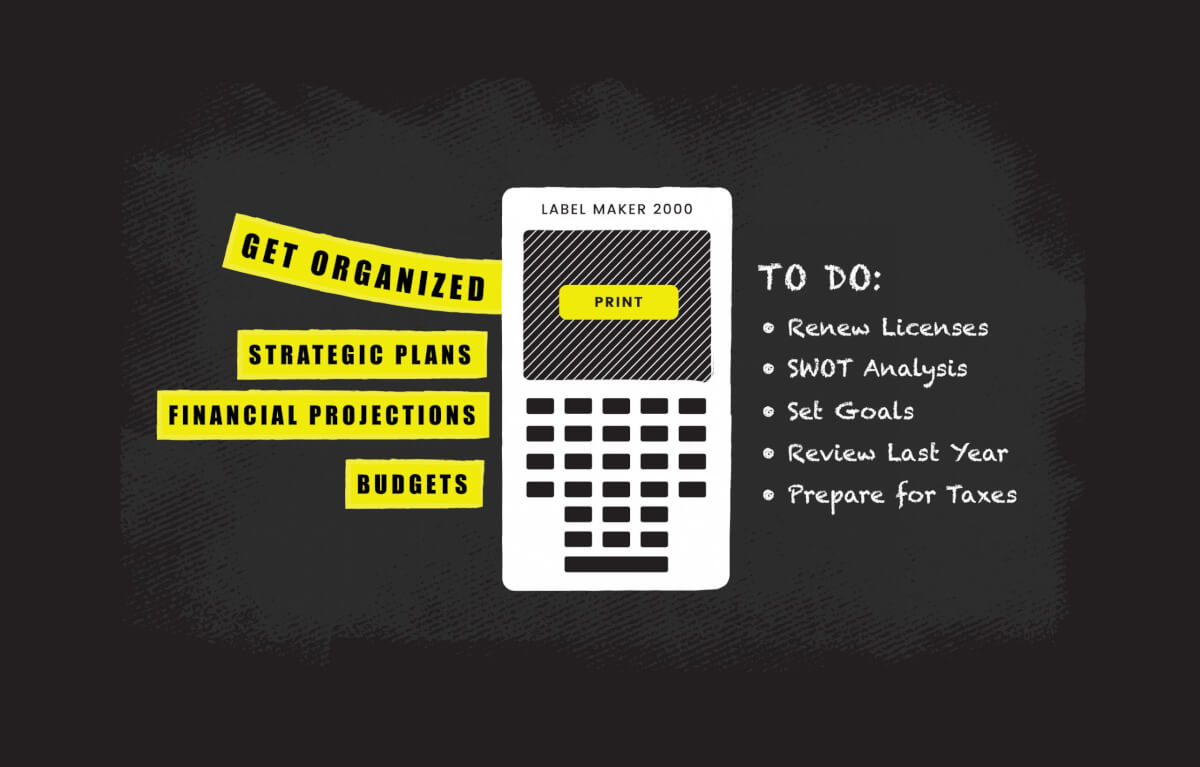Happy New Year! The beginning of the year is a great time to get organized in your business and prepare for the rest of the year. We’re sharing some tips on how to get organized for the year.
Reflect on Last Year
Start by asking yourself and your team members what worked and what didn’t work in your business last year. Be really honest. Try not to judge yourself for the things that didn’t work. It’s the past, and now is a good time to reflect on the learnings and identify ways to improve. I also like to organize these learnings and other information I have about the market trends and business landscape into a SWOT Analysis, which is a four-quadrant matrix used to look at a business’ strengths, weaknesses, opportunities, and threats.
Review Financial Information
Look back at your business’ financial performance for the year. If you have an accounting system already set up and have been keeping it up to date throughout the year, then you’re in good shape. If you haven’t been keeping your accounting system up to date or don’t have one in place, now’s a great time for you to put that infrastructure in place and get your data in the system. When all your data is in the accounting system, you can run reports to look at your monthly financial statements and drill down into specific areas of your income and expenses.
Set Annual Goals
Using the qualitative and quantitative data from your business performance, set goals for the year. Ask yourself “What are the things that we could do over the next year that will further the business’ purpose while leveraging its strengths and improving upon its weaknesses?” I recommend setting 3-5 annual goals using the S.M.A.R.T. goal framework. This framework helps you put your goals into concise statements that are specific, measurable, attainable, realistic, and time-bound.
Write a Strategic Plan
A strategic plan is a short planning document that can serve as your blueprint for the next year. Use it to start pulling together in one place your business’ mission, vision, values; reflections on last year and SWOT analysis; and annual goals. Then, add action plans to execute on those goals. An effective action plan should include specific tasks that need to be done, who’s responsible for them, and the timeframe in which they will be completed. You can then use this document to measure your progress towards your annual goals.
Create an Annual Budget
Turn your annual goals, strategic plan, and marketing calendar into a budget for the year. This is the monthly forecast of your business’ income, expenses, and cash flow for the upcoming year. Your budget should be based on historical financial performance as well as expected revenue growth and additional costs associated with your plans. For example, if you are planning on hiring a social media manager to help you grow your company’s following and increase sales, you would add in the additional costs of paying that person and identify when their efforts would start to kick in and how that would increase your revenue.
Renew Your Business Licenses
Many of the cities we operate in require a local business tax license, which often needs to be renewed at the beginning of the year. If you’re operating a limited liability company, cooperative, and corporation, you might be required to submit annual statements of information or other filings to your secretary of state. In addition, depending on the type of business you’re in and your location, you might have to renew other permits. Create a list of all the paperwork that needs to be submitted, their deadlines, and costs, and gather all the documents you need to fill out. Make sure you set reminders for yourself to submit the paperwork and fees before the deadline, so you don’t incur any fines.
Prepare for Taxes
Consider if you want to hire a tax preparer or fill out your business tax forms yourself. If you plan to use a tax preparer, make sure you start the process early. If you’re filing on your own, gather the appropriate forms. In either case, you’ll need to prepare a profit and loss statement, or P&L, for the last year. If you’ve reviewed your financial information as we suggested above, you should already have a P&L. Otherwise, now’s a good time to get your finances organized. Lastly, depending on other activities in your business, you might need to file additional paperwork. For example, if you have employees, you’ll need to file W-2s or if you’ve paid independent contractors, you might need to file 1099s by the end of January. Getting all this information together early in the year will ease your mind during tax season.
Don’t Forget Self-Care
It’s easy to get lost in all the planning and preparation at the beginning of the year. Don’t forget your self-care plan. Make sure your plans build in time for you to recharge and spend time outside of your business on the other things you value – spending time with family and friends, taking up a hobby or passion project, rejuvenating through self-care, or anything else that supports you to feel well-rounded. Remember that when you feel like a whole person, you bring your best self to your business.


Excellent Advice!